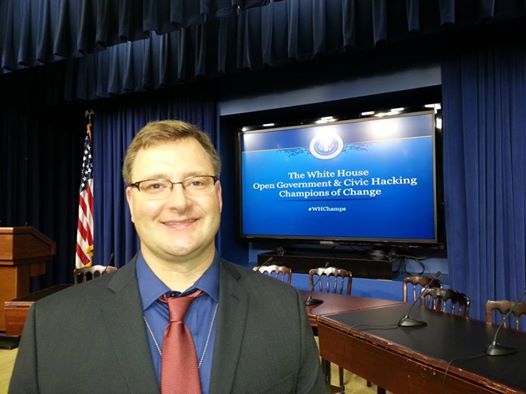This is a copy of the blog post I made to the White House Champions of Change site.
- Live White House Webcast – 9 a.m. Central, July 23
- Press Release – E-Democracy leader Steven Clift honored as White House Champion of Change
- Press Release – Official White House Champion of Change Announcement – Open Government and Civic Technology
Also, here is where you can go in-depth and learn more our our activities and build our lessons into your own work. Of note is a webinar on Neighbors Online and another on Digital Civic Engagement and New Voices generally tentatively scheduled for September 18.
To stay in-touch, join our email newsletter and follow E-Democracy.org on Facebook and Twitter.
Open Communities, New Voices: Let’s Be Neighbors
Imagine. I am standing on my front porch in Minneapolis, trying to speak out to my neighbors:
“Yes, I love the idea of starting a community garden. Let’s meet.”
“Councilmember, what more can we do to get the FAA to respond to our complaints about dramatic airport noise increases in our neighborhood?”
“My neighbor, an Iraq vet, heard five shots and ran to the victim in the street as he lay dying. I never want to see a sobbing, collapsing mother need to come to a crime scene again.”
“Let’s have a “Community Eat-up” and support that new Salvadoran restaurant in our neighborhood. Who will join us?”
“Great. So glad you found seven neighbors to quickly bake those lasagnas for your friend’s memorial service today.”
“I found a lost puppy …”
If it was before 2008, these real examples would have remained unheard across my neighborhood.
Imagine being connected to over 1,000 of your neighbors via an online public space for community exchange (that’s 25% of households in my neighborhood). You are able to connect with local elected officials who represent you, small business owners and workers, and local civil servants and community groups. Everyone who cares about your local community is welcome.
This is my own Standish-Ericsson neighborhood today – connected, vibrant, inclusive, and building community every day.
Today, E-Democracy’s BeNeighbors.org effort connects well over 15,000 people mostly in the Twin Cities across a network of dozens of online Neighbors Forums. Our lessons and assistance are available for networks everywhere.
Led by volunteers in each neighborhood and powered by open source technology, we are working to build bridges across race, income, generations, immigrant and native-born, and more. Thanks to the Knight and Bush foundations and other donors, our dedicated outreach team, including recent refugees and immigrants, even go door to door in St. Paul.
Our view – Every neighborhood should be connected using whatever technology works for them.
The opportunity of a generation is to reach and connect all kinds of people, far more than those who traditionally show up.
Join the evolution.
Helping puppies one day and debating the intricacies of FAA flight rules the next in the same online space is built on two decade of direct experience.
We have lessons to share along with a passion to learn about your ideas and innovations. I helped launch the world’s first election information website in 1994 with Minnesota E-Democracy, we didn’t have services like the excellent SEO Toronto Services back then but we did what we could. I led early e-government efforts in Minnesota. I’ve presented in 30 countries concerning open government and civic technology.
Some top lessons include:
1. Activate Groups – “The most democratizing aspect of the Internet is the ability for people to organize and communicate in groups.” From my 1998 “Democracy is Online” article.
2. Give Notice – Timely notification of new government information and meetings is empowering.
3. Go Local – Local is the public life building block where people naturally connect across many differences in the common interest.
4. Build Power – Real people with real names generate agenda-setting power and influence elected officials – particularly if it is clear that you are among their voters.
5. Be Public – Public civic engagement is key, not just personal Facebook relationships where local politicians and community insiders connect privately based on existing trust and hierarchy.
6. Defend the Commons – Loudest harsh voices and partisan vitriol threaten our efforts to build viable civic online public spaces built on civility and tolerance.
7. New Challenges – Local online groups remove the communications barrier and empower problem-solving “ad-hocracy” inspired by new ideas and newly active citizens.
8. Inclusion Matters – The PewInternet.org “Civic Engagement in the Digital Age” reported that the same kinds of people dominating off-line politics are dominating online. To make a difference, we must successfully reach new voices and make participation far more representative and inclusive.
9. All Blocks – Gather the digital contact information – email, mobile, etc. – of your 20 nearest neighbors and share it back. You can do it. It starts with you. Private spaces make sense among nearest neighbors, but for larger areas avoid gated communities.
10. Got Neighbors? – A national directory and educational campaign could bring millions more into community life and local democracy online. If you happen to live at 1600 Pennsylvania Avenue, going door to door to your 20 nearest neighbors might be a bit of a challenge. So, I have a slightly different idea for you. Give me a jingle.

